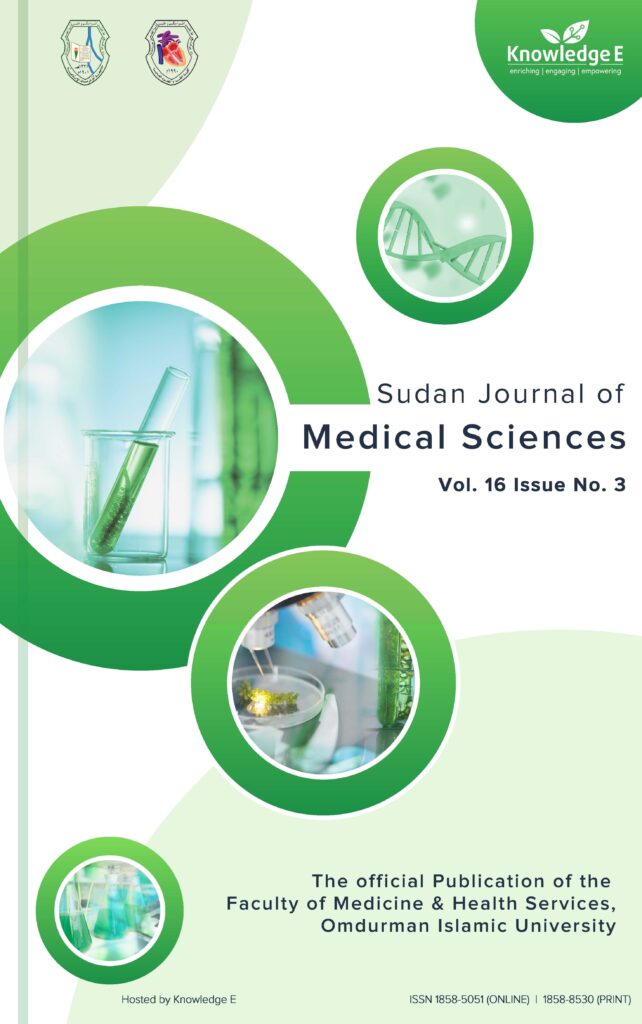
Sudan Journal of Medical Sciences
ISSN: 1858-5051
High-impact research on the latest developments in medicine and healthcare across MENA and Africa
Primary School Teachers’ Perspectives on ADHD in Alkadrow, Khartoum, Sudan
Published date: Dec 29 2023
Journal Title: Sudan Journal of Medical Sciences
Issue title: Sudan JMS: Volume 18 (2023), Issue No. 4
Pages: 478 – 487
Authors:
Abstract:
Background: Attention deficit hyperactivity disorder, which is a prevalent neurodevelopmental condition, commonly manifests during early childhood and has the potential to adversely affect an individual’s social, academic, and occupational performance in multiple settings. Students with ADHD may struggle with attention, focus, listening, and completing schoolwork. Additionally, they may exhibit restless or disruptive behavior in class and may have learning disabilities that affect their academic performance. The aim of this study was to explore the perspectives of primary school teachers on ADHD in Alkadrow, Khartoum, Sudan.
Methods: A descriptive cross-sectional study was conducted in Alkadrow-Bahri locality, Sudan, over a period of three to six months in 2022. The study population included primary school teachers who had taught for at least one year and encountered at least one student with ADHD. A convenience sampling technique was used to select a minimum of 59 participants, and data were collected using a self-administered questionnaire with closed-ended questions. SPSS version 23 was used to analyze the data, including descriptive statistics and inferential statistics such as chi-square tests and logistic regression analysis.
Results: The study had 59 participants, with the majority being female and in the age group of 41–45 years. The participants were mostly married and had obtained psychology courses, with a bachelor’s degree being the most common level of education. Many participants had over 20 years of teaching experience. Regarding the attitude toward attention deficit hyperactivity, most participants strongly agreed that they did have a negative/positive attitude toward it, and a majority agreed or were neutral toward ADHD. However, in the case of attention deficit hyperactivity, a significant percentage of participants disagreed or strongly disagreed with the statement.
Conclusion: The study found that most participants had a negative attitude toward student referrals for medical care and believed that most symptoms of ADHD can be lowered by aging. Additionally, more than half strongly disagreed that punishment has a positive effect on ADHD.
Keywords: primary school teachers, perspectives, ADHD, Khartoum, Sudan
References:
[1] Jiang, X., Xing, Y., Zhang, T., Huang, W., Gao, C., & Chen, Y. (2019). Poster abstract: A wearable diagnostic assessment system for attention deficit hyperactivity disorder [Internet]. IEEE Xplore. Available from https://ieeexplore.ieee.org/abstract/document/8908639
[2] Centers for Disease Control and Prevention. (2021). What Is ADHD? [Internet]. Centers for Disease Control and Prevention. https://www.cdc.gov/ncbddd/adhd/facts.html
[3] Centers for Disease Control and Prevention. (2019). ADHD in the classroom [Internet]. Centers for Disease Control and Prevention. https://www.cdc.gov/ncbddd/adhd/school-success.html
[4] Koonce, D. A., & Harper, W., Jr. (2005). Engaging African American parents in the schools: A community-based consultation model. Journal of Educational & Psychological Consultation, 16(1–2), 55–74. https://doi.org/10.1080/10474412.2005.9669527
[5] Parekh, R. (2017). What Is ADHD? [Internet]. American Psychiatric Association. https://www.psychiatry.org/patients-families/adhd/what-is-adhd
[6] Menikdiwela, K. R., & Vojtova, V. (2017). Attention-deficit/hyperactivity disorder through Sri Lankan primary school teachers’ eyes [Internet]. Journal of Education and Practice, 8(2), 4–10.
[7] Hosseinnia, M., Mazaheri, M. A., & Heidari, Z. (2020). Knowledge, attitude, and behavior of elementary teachers regarding attention deficit hyperactivity disorder. Journal of Education and Health Promotion, 9, 120.
[8] Alanazi, F., & Al-Turki, Y. (2021). Knowledge and attitude of Attention Deficit and Hyperactivity Disorder (ADHD) among male primary school teachers, in Riyadh City, Saudi Arabia. Journal of Family Medicine and Primary Care.
[9] Dessie, M., Techane, M. A., Tesfaye, B., & Gebeyehu, D. A. (2021). Elementary school teachers knowledge and attitude towards attention deficit-hyperactivity disorder in Gondar, Ethiopia: A multi-institutional study. Child and Adolescent Psychiatry and Mental Health, 15(1), 16.
[10] Amha, H., & Azale, T. (2022). Attitudes of primary school teachers and its associated factors toward students with attention deficit hyperactivity disorder in Debre Markos and Dejen Towns, Northwest Ethiopia. Frontiers in Pediatrics, 10, 805440.
[11] Alfageer, H. H., Aldawodi, M. D., Al Queflie, S. A., Masud, N., Al Harthy, N. A., Alogayyel, N., Alrabah, M., & Qureshi, S. (2018). Knowledge and attitude of male primary school teachers about attention deficit and hyperactivity disorder in Riyadh, Saudi Arabia. Journal of Natural Science, Biology and Medicine, 9(2).
[12] Rodrigo, M. D., Perera, D., Eranga, V. P., Williams, S. S., & Kuruppuarachchi, K. A. (2011). The knowledge and attitude of primary school teachers in Sri Lanka towards childhood attention deficit hyperactivity disorder. The Ceylon Medical Journal, 56(2), 51–54.
[13] Khademi, M., Rajeziesfahani, S., Noorbakhsh, S., Panaghi, L., Davari-Ashtiani, R., Razjouyan, K., & Salamatbakhsh, N. (2016). Knowledge and attitude of primary school teachers in Tehran, Iran towards ADHD, and SLD. Global Journal of Health Science, 8(12), 145.
[14] Moldavsky, M., Pass, S., & Sayal, K. (2014). Primary school teachers’ attitudes about children with attention deficit/hyperactivity disorder and the role of pharmacological treatment. Clinical Child Psychology and Psychiatry, 19(2), 202–216.